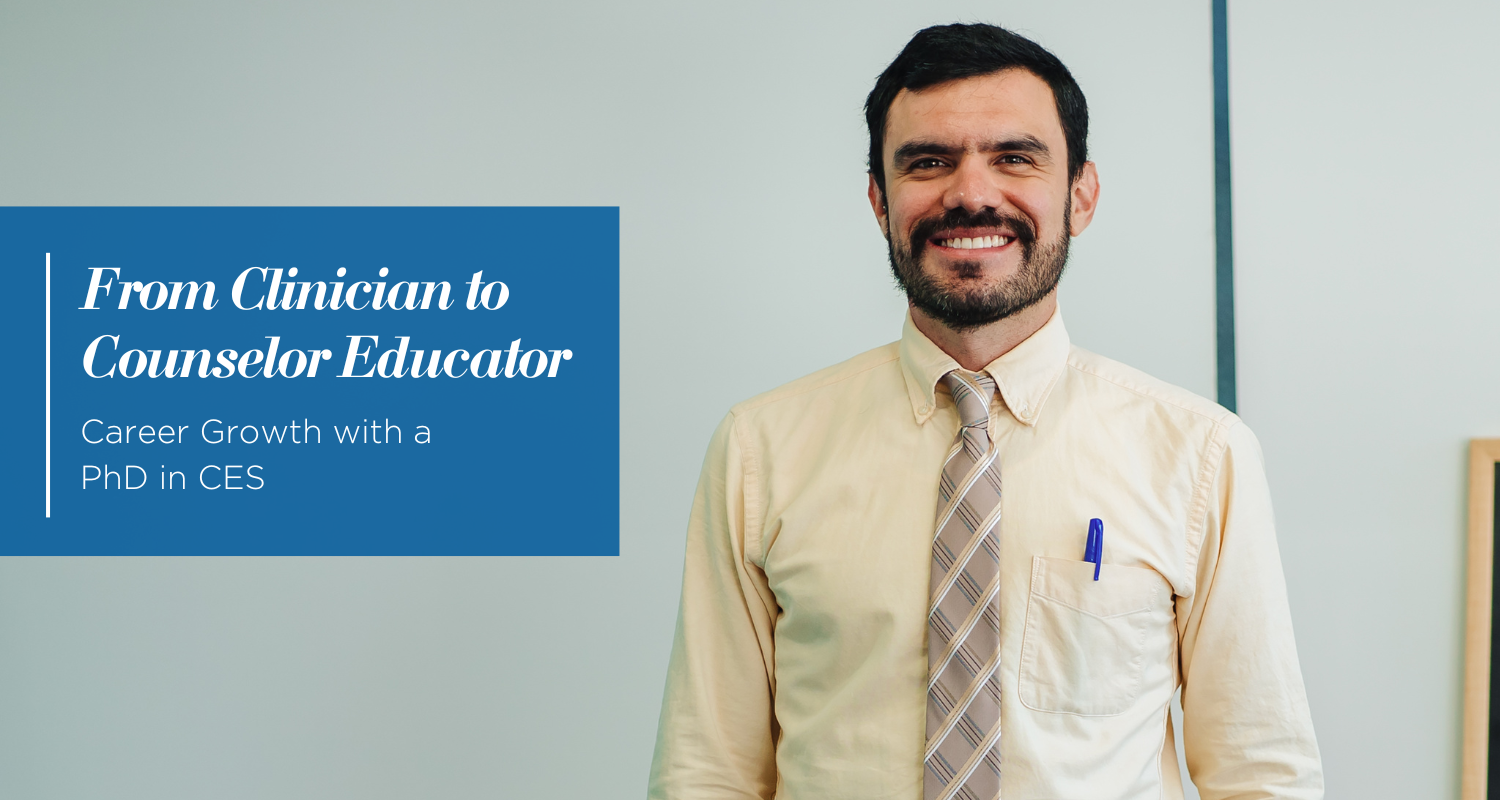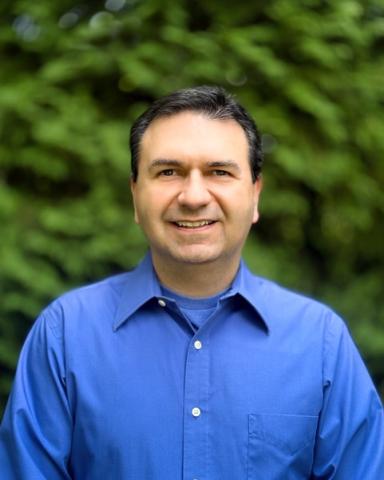
From Clinician to Counselor Educator: How Your Experience Translates to the Classroom

You’re Already Teaching: A PhD in Counselor Education and Supervision Will Let You Do More of It
Think about your daily work. Have you ever run a supervision group, facilitated a clinical training, or onboarded new staff? Maybe you’ve led CE workshops, spoken at conferences, or offered informal consultations to peers. If any of this sounds familiar, here’s the good news: you’re already teaching! You just haven’t been calling it that.
Counselor education isn’t limited to lecturing in front of a classroom. It’s also about modeling ethical practice, scaffolding new skills, and guiding reflection—skills you’ve likely developed in your clinical and supervisory work.
Clinical supervisors, program leads, and experienced counselors do this every day. They support growth, provide feedback, and help shape future practitioners. A PhD in Counselor Education and Supervision (CES) simply formalizes and expands what many clinicians already do. If you find joy in these moments of mentorship, that’s a strong sign you’re ready to continue to evolve your professional identity.
Explore our PhD Counselor Education and Supervision program
Why Lived Clinical Experience Matters in Academia
In counselor education, real-world experience is not just welcome; it’s essential.
Students need more than theory; they need faculty who understand the complexity of therapeutic work and can bridge research with practice. That’s where practitioner-educators shine. You know what it’s like to sit with grief, to navigate ethical gray areas, to hold space for trauma, growth, and healing. You’ve lived the challenges your students will face. And that lived experience becomes the foundation of transformational teaching—with valuable knowledge that is not available in textbooks.
In fact, counseling programs increasingly seek faculty who bring both scholarly and clinical credibility and who can “translate” from textbook to application. Your background doesn’t put you behind—it positions you ahead. You offer authenticity, case-based learning, and a clear grasp of what matters most in real-world counseling.
And if you’ve ever wondered whether your path qualifies you for academic spaces, consider this: the ability to connect theory to practice is one of the most sought-after skills in counselor education. For example, In a study on clinical teaching, students identified teachers who helped them make connections between counseling theories and actual clinical work as particularly effective (Moate et al., 2017). Thus, your experience isn’t an add-on; it’s a cornerstone!
Sample Teaching and Supervision Roles
Still unsure what counselor educators actually do day to day? Here’s a glimpse into the kinds of roles doctoral graduates tend to hold:
- Adjunct Faculty or Assistant Professor: Teach core courses in graduate counseling programs, such as ethics, techniques, or multicultural counseling.
- Skills Lab Facilitator or Guest Lecturer: Lead hands-on sessions where students practice interventions or simulate counseling sessions.
- Practicum/Internship Supervisor: Oversee clinical training experiences, providing direct supervision and feedback.
- Course Designer: Develop curriculum that integrates adult learning theory, universal design for learning (UDL) guidelines (CAST, 2024), and Council for Accreditation of Counseling and Related Educational Programs standards (CACREP).
- Fieldwork or Clinical Coordinator: Match students with clinical sites and support their progress through the practicum or internship year.
- CE Trainer or Consultant: Offer continuing education workshops or serve as an expert consultant to educational institutions, nonprofits, or government agencies.
Each of these roles builds directly on your clinical foundation and exists in a variety of settings, including graduate programs and community colleges, hospitals and outpatient clinics, government agencies, and private organizations.
Bridging the Confidence Gap: You Don’t Need to Reinvent Yourself
It’s common for experienced counselors to feel a little nervous when stepping into academia. You might be thinking:
“I’ve never published.”
“I don’t see myself as a ‘professor.’”
“I don’t know if I belong in a doctoral program.”
“I haven’t done policy work before.”
But here’s the truth: you don’t need to have all the answers before you begin. Doctoral programs aren’t looking for polished academics; they’re looking for passionate professionals ready to apply a growth mindset to continue developing their knowledge and skills. One thing worth noting is that confidence often lags behind capability. So, if you’ve successfully led teams, supervised interns, managed complex cases, or advocated for clients, you already have many of the skills needed to succeed as a counselor educator. The doctoral journey isn’t about changing who you are; it’s about building on what you already bring.
Another way to conceptualize confidence gaps is to think about the opportunities that await. You’ll develop new competencies like research design, increased knowledge of counseling theory, curriculum design, and scholarly writing. While some of these will be a bit newer to you, many grow out of the values and instincts you’ve been honing for years: empathy, ethics, critical thinking, and a desire to help others thrive.
Building on Strengths in a Doctoral Program
One of the most encouraging aspects of a PhD in CES is that it’s not a solo reinvention—it’s a supported evolution.
Doctoral programs are designed to help working professionals become scholar-practitioners. You’ll learn how to:
- Translate your clinical stories into case-based instruction
- Build a personal philosophy of teaching
- Apply adult learning principles to in-person and online environments
- Design equitable and inclusive supervision models
- Explore how identity, power, and systemic factors impact learning and supervision
Graduate programs also provide a variety of supports: mentorship, opportunities to co-teach, and structured training in curriculum development. Many institutions intentionally include teaching practicums and supervised instructional experiences that ease the transition into academia. You’re not just thrown into a classroom without support; you’re developed into a leader with access to a growing list of teaching tools.
Anchor Reflection: What Have You Already Been Doing?
As you consider your next professional chapter, reflect on these questions:
- In what ways have you already been teaching or mentoring whether formally or informally?
- Do you enjoy helping others grow in their counseling skills?
- Could your clinical background be an exemplar for new counselors?
If your answer is “yes,” then counselor education may be a good fit for you.
You’ve already done the hard work of becoming an ethical, compassionate clinician. Now, you have the opportunity to shape the next generation by passing on what you’ve learned, influencing the systems that support counseling practice, and building a legacy grounded in equity and inclusion.
Remember, you are not starting from scratch. You are building on a strong foundation for continued professional growth. And that’s exactly what doctoral education is designed to support. Curious? Take a look at the course sequence for the PhD in CES.

About the Author
Dr. Alex Casillas is a seasoned psychologist and educator with over two decades of experience in applied psychology, assessment, and counselor education. Currently serving as a Principal Research Psychologist in the assessment industry and an Adjunct Instructor in Applied Psychology at NYU Steinhardt, Dr. Casillas bridges research and practice to enhance counselor training and educational equity. His academic journey includes a PhD from the University of Iowa and a B.A. from Grinnell College. He is originally from Mexico and a fierce advocate of inclusion, belonging, and equity. Through his work, Dr. Casillas emphasizes the importance of culturally responsive practices and empirically-informed strategies in counselor education.
